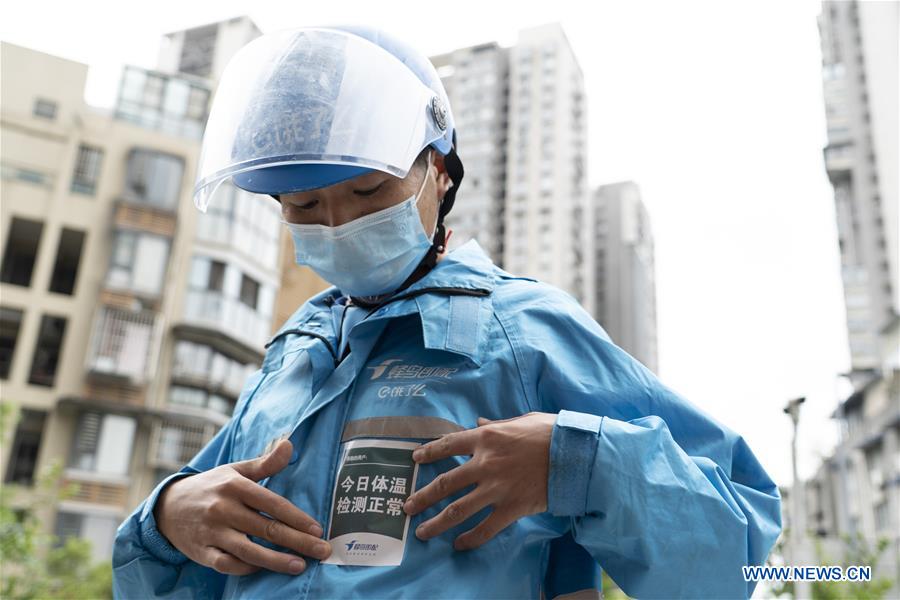Delivery man from deep mountains rides past poverty
Xinhua,May 15, 2020 Adjust font size:
Qiu Youhazi puts on a label of normal body temperature after undergoing a temperature test at a food delivery site in Chengdu, capital of southwest China's Sichuan Province, April 22, 2020. (Xinhua/Li Mengxin)
by Xinhua writers Yang Di, Lu Youyi and Lyu Qiuping
Qiu Youhazi shuttles through concrete jungles on his electric bicycles and climbs up and down in urban buildings from 7:30 a.m. to 11 p.m. every day to deliver meals. The 28-year-old does not think his job is tiring as he has been running in the mountains since childhood.
Born and raised in a remote village in Liangshan Yi Autonomous Prefecture, southwest China's Sichuan Province, Qiu is a food courier in the provincial capital of Chengdu, some 11 hours' drive from his village.
The name Youhazi, meaning "a man bringing the hope of making fortune" in Yi ethnic language, was given by his parents, who expected their son to shake off poverty that has been lingering for generations.
Liangshan, home to 178,000 impoverished people, is one of the poorest regions in China. The last seven counties that remain on the list of Sichuan's poor county regions are all located in the prefecture.
China aims to eradicate absolute poverty this year. By the end of last year, there were still over 5.5 million people living under the poverty line across the country.
When the meager farm yield out of the barren lands can hardly support local households, young generations go out to work at an early age, including Qiu.
Two years ago, Qiu’s wife gave birth to twins, while the eldest son was still a toddler. As the breadwinner of the family, the young father, who used to earn 4,000 yuan (564 U.S. dollars) a month at an electronics plant in Chongqing Municipality, quit his job and decided to deliver online meal orders last October.
"I heard delivering food could almost double my income at the time," he said.
Figures show online food delivery transactions exceeded 720 billion yuan in the country in 2019. Explosive growth is further expected this year, as the novel coronavirus epidemic has forced a large number of people to order online, waiting for their meals to be delivered to their doorstep. Analysts estimate that there are now more than 7 million food couriers across the country.
On his first day of work, Qiu followed experienced riders, delivering 29 orders -- a fairly good performance.
Working day and night, the green hand earned more than 8,000 yuan in the first month and 13,000 yuan in the following month, ranking first among the delivery team.
"In fact, there is no trick other than working hard," he said. With more than 20,000 steps a day, Qiu has lost 6 kg. He has also become so familiar with the neighborhood that he does not need navigation while working.
As time goes on, Qiu has realized the job is not as simple as picking up and delivering food.
Once, a customer yelled at him when he was slightly late bringing a coffee order on time, which made him sad and frustrated. "I couldn't help but wonder whether this was the right job for me," he recalled, realizing communication with customers was also important.
Till now, Qiu has kept a "zero bad reviews" record, which is very rare among his peers.
Qiu has also been moved by strangers. During a midnight delivery, he found an old man waiting for him at the gate of a residential community.
"I was worried about your electric bicycle being stolen, so I kept an eye on it," the elder told him.
In March, online delivery workers were listed as one of the 16 new occupations by the Ministry of Human Resources and Social Security.
A report released by the e-commerce giant Alibaba in April said among the food delivery workers registered at its online platform of Eleme, nearly 300,000 are from state-level impoverished counties, with their monthly income exceeding 5,800 yuan on average.
Wei Baigang, head of the development planning department of the Ministry of Agriculture and Rural Affairs, said 90 percent of the registered impoverished population received industrial and employment support, more than two-thirds of whom successfully cast off poverty by working in cities or local industries.
In merely half a year, Qiu transferred 30,000 yuan to his family.
Now that he has a much higher income, he has a long list of wishes, such as buying an apartment and sending his children to town for school -- dreams that he never thought he could reach before.
Qiu said his parents did not think school was necessary considering their children would end up toiling in the field anyway. But when he came out of the mountains and struggled in the cities, he recognized the importance of education.
"I have planned to buy an apartment in town so that my children can go to the best school in the county," he said. (Yin Heng contributed to the story)

2f8ae8e9-3cbb-4325-b2c9-e27d44268389.jpg)